International Trade Law: Competition, Sales, and Finance Analysis
VerifiedAdded on 2023/01/13
|11
|3845
|23
Report
AI Summary
This report provides a comprehensive overview of international trade law, delving into several key areas. It begins by examining the role of international competition policy in environmental regulations and strategic environmental protection for global trade, followed by an explanation of the classical theory of distortions used to measure trade barriers. The report then critically describes various types of preferential agreements and their rationales, along with an analysis of the economic bases of the rules and principles of the GATT. The second part of the report focuses on international sales contracts, assessing their core components, the rights and obligations they impose, and the implications of conducting international contracts online. Finally, the report identifies different types of exchange rates, regulatory, and legal considerations associated with international trade, and critically assesses the legal rules related to financing international sales. The report concludes with a summary of the key findings and implications of international trade law.
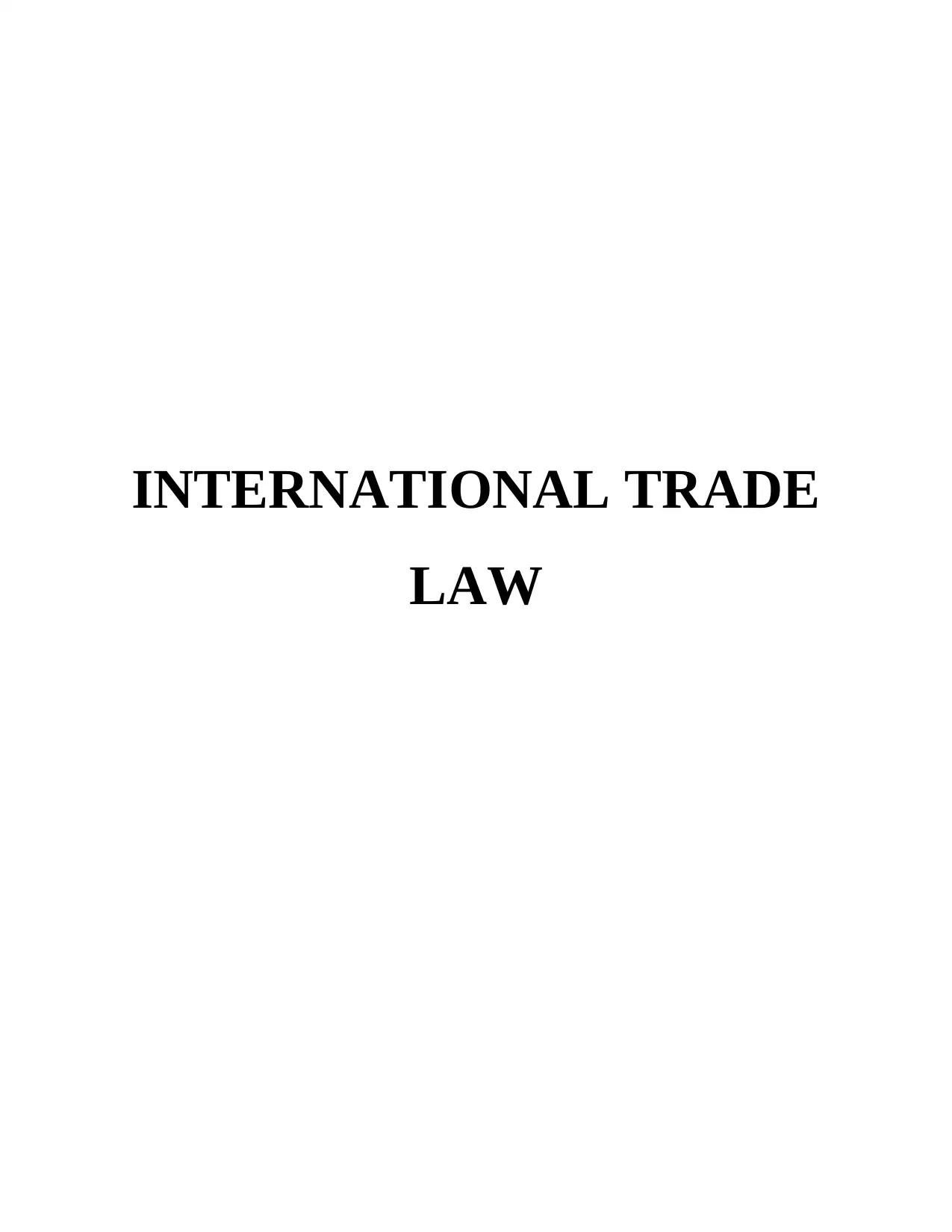
INTERNATIONAL TRADE
LAW
LAW
Paraphrase This Document
Need a fresh take? Get an instant paraphrase of this document with our AI Paraphraser
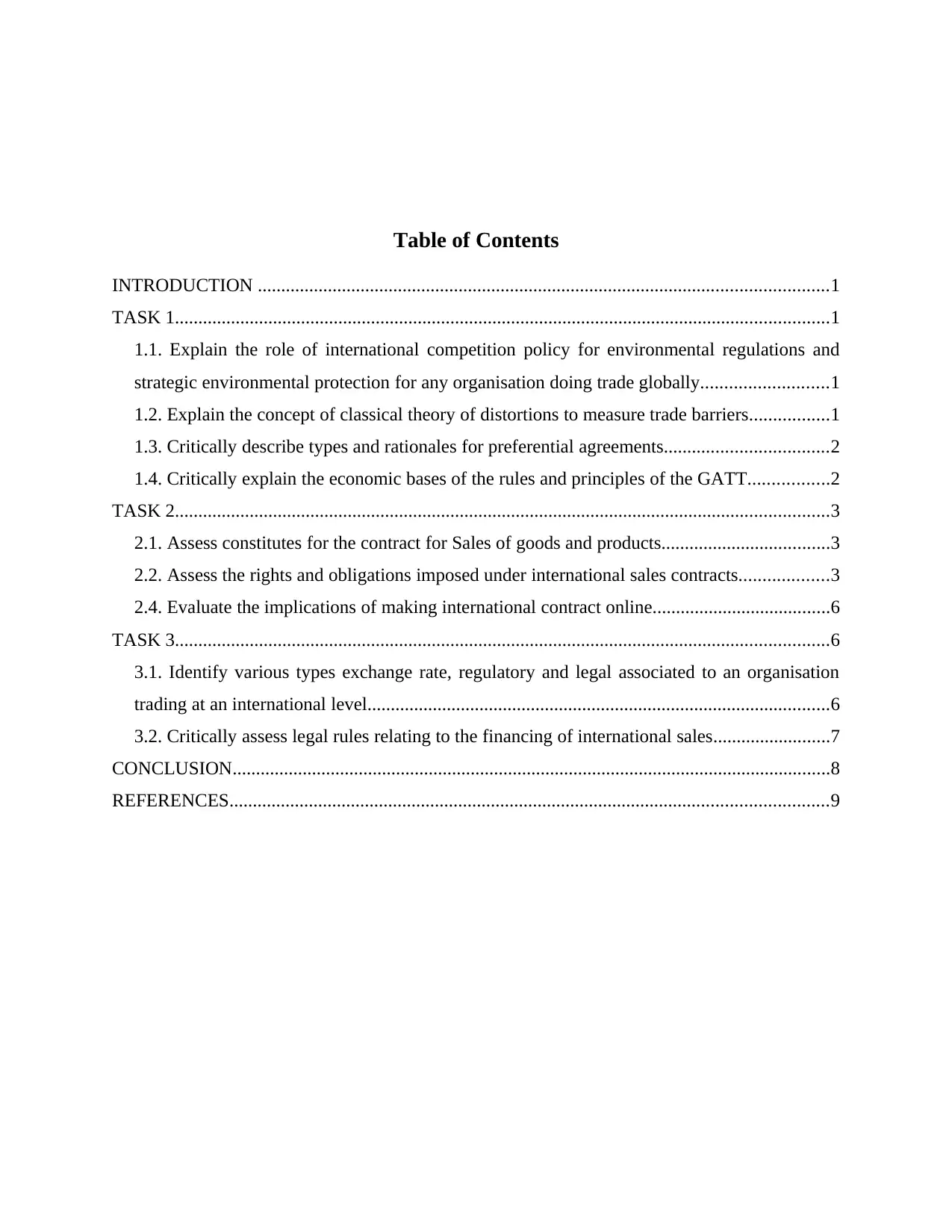
Table of Contents
INTRODUCTION ..........................................................................................................................1
TASK 1............................................................................................................................................1
1.1. Explain the role of international competition policy for environmental regulations and
strategic environmental protection for any organisation doing trade globally...........................1
1.2. Explain the concept of classical theory of distortions to measure trade barriers.................1
1.3. Critically describe types and rationales for preferential agreements...................................2
1.4. Critically explain the economic bases of the rules and principles of the GATT.................2
TASK 2............................................................................................................................................3
2.1. Assess constitutes for the contract for Sales of goods and products....................................3
2.2. Assess the rights and obligations imposed under international sales contracts...................3
2.4. Evaluate the implications of making international contract online......................................6
TASK 3............................................................................................................................................6
3.1. Identify various types exchange rate, regulatory and legal associated to an organisation
trading at an international level...................................................................................................6
3.2. Critically assess legal rules relating to the financing of international sales.........................7
CONCLUSION................................................................................................................................8
REFERENCES................................................................................................................................9
INTRODUCTION ..........................................................................................................................1
TASK 1............................................................................................................................................1
1.1. Explain the role of international competition policy for environmental regulations and
strategic environmental protection for any organisation doing trade globally...........................1
1.2. Explain the concept of classical theory of distortions to measure trade barriers.................1
1.3. Critically describe types and rationales for preferential agreements...................................2
1.4. Critically explain the economic bases of the rules and principles of the GATT.................2
TASK 2............................................................................................................................................3
2.1. Assess constitutes for the contract for Sales of goods and products....................................3
2.2. Assess the rights and obligations imposed under international sales contracts...................3
2.4. Evaluate the implications of making international contract online......................................6
TASK 3............................................................................................................................................6
3.1. Identify various types exchange rate, regulatory and legal associated to an organisation
trading at an international level...................................................................................................6
3.2. Critically assess legal rules relating to the financing of international sales.........................7
CONCLUSION................................................................................................................................8
REFERENCES................................................................................................................................9
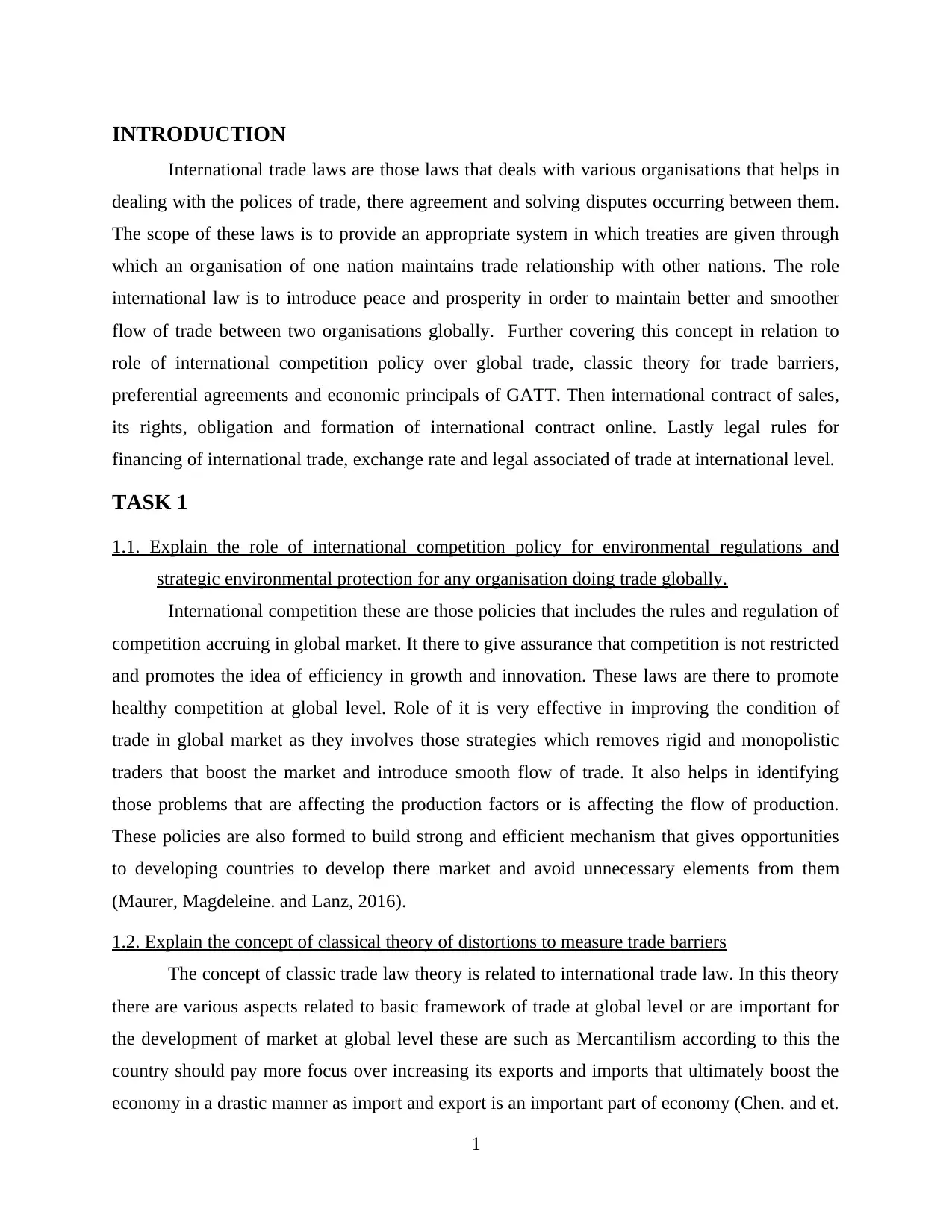
INTRODUCTION
International trade laws are those laws that deals with various organisations that helps in
dealing with the polices of trade, there agreement and solving disputes occurring between them.
The scope of these laws is to provide an appropriate system in which treaties are given through
which an organisation of one nation maintains trade relationship with other nations. The role
international law is to introduce peace and prosperity in order to maintain better and smoother
flow of trade between two organisations globally. Further covering this concept in relation to
role of international competition policy over global trade, classic theory for trade barriers,
preferential agreements and economic principals of GATT. Then international contract of sales,
its rights, obligation and formation of international contract online. Lastly legal rules for
financing of international trade, exchange rate and legal associated of trade at international level.
TASK 1
1.1. Explain the role of international competition policy for environmental regulations and
strategic environmental protection for any organisation doing trade globally.
International competition these are those policies that includes the rules and regulation of
competition accruing in global market. It there to give assurance that competition is not restricted
and promotes the idea of efficiency in growth and innovation. These laws are there to promote
healthy competition at global level. Role of it is very effective in improving the condition of
trade in global market as they involves those strategies which removes rigid and monopolistic
traders that boost the market and introduce smooth flow of trade. It also helps in identifying
those problems that are affecting the production factors or is affecting the flow of production.
These policies are also formed to build strong and efficient mechanism that gives opportunities
to developing countries to develop there market and avoid unnecessary elements from them
(Maurer, Magdeleine. and Lanz, 2016).
1.2. Explain the concept of classical theory of distortions to measure trade barriers
The concept of classic trade law theory is related to international trade law. In this theory
there are various aspects related to basic framework of trade at global level or are important for
the development of market at global level these are such as Mercantilism according to this the
country should pay more focus over increasing its exports and imports that ultimately boost the
economy in a drastic manner as import and export is an important part of economy (Chen. and et.
1
International trade laws are those laws that deals with various organisations that helps in
dealing with the polices of trade, there agreement and solving disputes occurring between them.
The scope of these laws is to provide an appropriate system in which treaties are given through
which an organisation of one nation maintains trade relationship with other nations. The role
international law is to introduce peace and prosperity in order to maintain better and smoother
flow of trade between two organisations globally. Further covering this concept in relation to
role of international competition policy over global trade, classic theory for trade barriers,
preferential agreements and economic principals of GATT. Then international contract of sales,
its rights, obligation and formation of international contract online. Lastly legal rules for
financing of international trade, exchange rate and legal associated of trade at international level.
TASK 1
1.1. Explain the role of international competition policy for environmental regulations and
strategic environmental protection for any organisation doing trade globally.
International competition these are those policies that includes the rules and regulation of
competition accruing in global market. It there to give assurance that competition is not restricted
and promotes the idea of efficiency in growth and innovation. These laws are there to promote
healthy competition at global level. Role of it is very effective in improving the condition of
trade in global market as they involves those strategies which removes rigid and monopolistic
traders that boost the market and introduce smooth flow of trade. It also helps in identifying
those problems that are affecting the production factors or is affecting the flow of production.
These policies are also formed to build strong and efficient mechanism that gives opportunities
to developing countries to develop there market and avoid unnecessary elements from them
(Maurer, Magdeleine. and Lanz, 2016).
1.2. Explain the concept of classical theory of distortions to measure trade barriers
The concept of classic trade law theory is related to international trade law. In this theory
there are various aspects related to basic framework of trade at global level or are important for
the development of market at global level these are such as Mercantilism according to this the
country should pay more focus over increasing its exports and imports that ultimately boost the
economy in a drastic manner as import and export is an important part of economy (Chen. and et.
1
⊘ This is a preview!⊘
Do you want full access?
Subscribe today to unlock all pages.

Trusted by 1+ million students worldwide
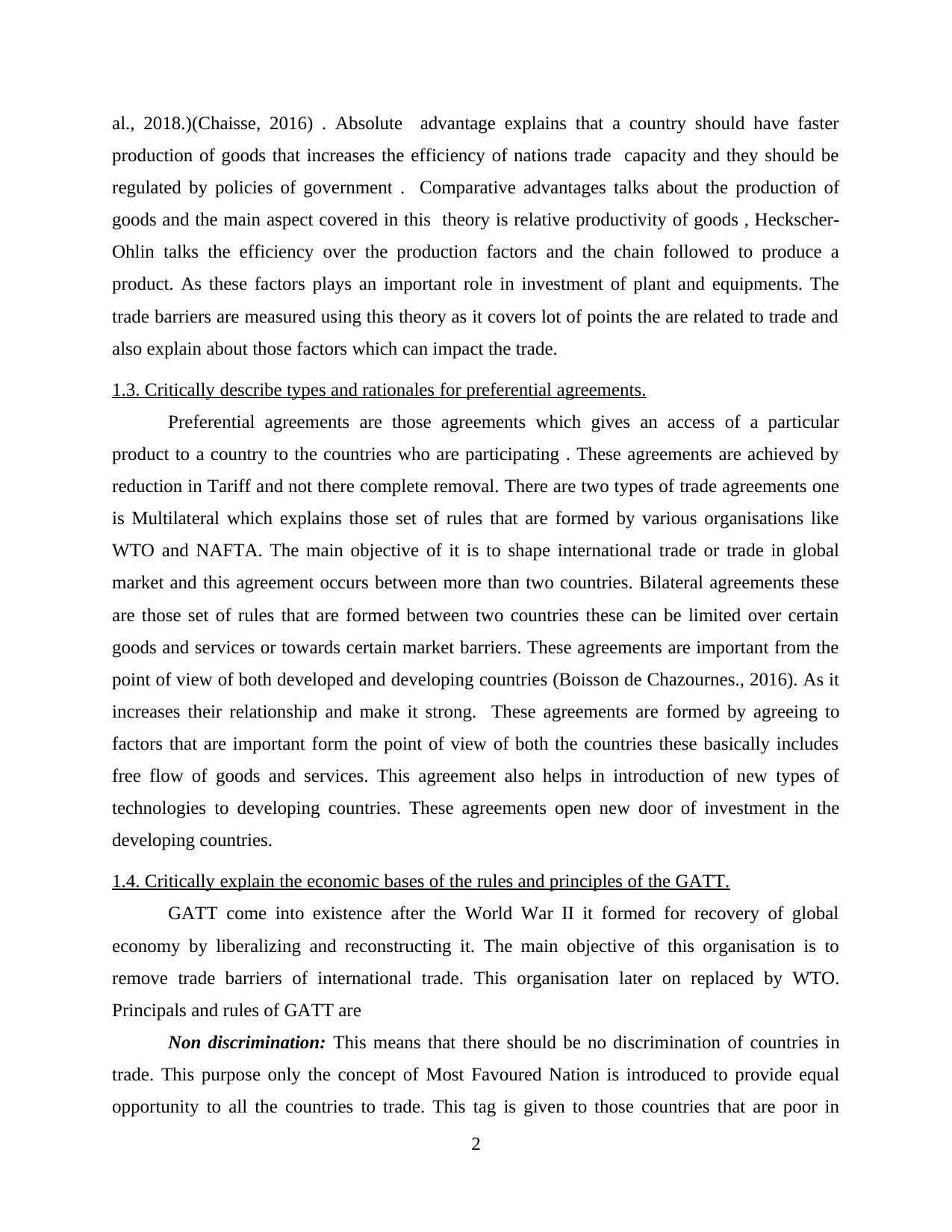
al., 2018.)(Chaisse, 2016) . Absolute advantage explains that a country should have faster
production of goods that increases the efficiency of nations trade capacity and they should be
regulated by policies of government . Comparative advantages talks about the production of
goods and the main aspect covered in this theory is relative productivity of goods , Heckscher-
Ohlin talks the efficiency over the production factors and the chain followed to produce a
product. As these factors plays an important role in investment of plant and equipments. The
trade barriers are measured using this theory as it covers lot of points the are related to trade and
also explain about those factors which can impact the trade.
1.3. Critically describe types and rationales for preferential agreements.
Preferential agreements are those agreements which gives an access of a particular
product to a country to the countries who are participating . These agreements are achieved by
reduction in Tariff and not there complete removal. There are two types of trade agreements one
is Multilateral which explains those set of rules that are formed by various organisations like
WTO and NAFTA. The main objective of it is to shape international trade or trade in global
market and this agreement occurs between more than two countries. Bilateral agreements these
are those set of rules that are formed between two countries these can be limited over certain
goods and services or towards certain market barriers. These agreements are important from the
point of view of both developed and developing countries (Boisson de Chazournes., 2016). As it
increases their relationship and make it strong. These agreements are formed by agreeing to
factors that are important form the point of view of both the countries these basically includes
free flow of goods and services. This agreement also helps in introduction of new types of
technologies to developing countries. These agreements open new door of investment in the
developing countries.
1.4. Critically explain the economic bases of the rules and principles of the GATT.
GATT come into existence after the World War II it formed for recovery of global
economy by liberalizing and reconstructing it. The main objective of this organisation is to
remove trade barriers of international trade. This organisation later on replaced by WTO.
Principals and rules of GATT are
Non discrimination: This means that there should be no discrimination of countries in
trade. This purpose only the concept of Most Favoured Nation is introduced to provide equal
opportunity to all the countries to trade. This tag is given to those countries that are poor in
2
production of goods that increases the efficiency of nations trade capacity and they should be
regulated by policies of government . Comparative advantages talks about the production of
goods and the main aspect covered in this theory is relative productivity of goods , Heckscher-
Ohlin talks the efficiency over the production factors and the chain followed to produce a
product. As these factors plays an important role in investment of plant and equipments. The
trade barriers are measured using this theory as it covers lot of points the are related to trade and
also explain about those factors which can impact the trade.
1.3. Critically describe types and rationales for preferential agreements.
Preferential agreements are those agreements which gives an access of a particular
product to a country to the countries who are participating . These agreements are achieved by
reduction in Tariff and not there complete removal. There are two types of trade agreements one
is Multilateral which explains those set of rules that are formed by various organisations like
WTO and NAFTA. The main objective of it is to shape international trade or trade in global
market and this agreement occurs between more than two countries. Bilateral agreements these
are those set of rules that are formed between two countries these can be limited over certain
goods and services or towards certain market barriers. These agreements are important from the
point of view of both developed and developing countries (Boisson de Chazournes., 2016). As it
increases their relationship and make it strong. These agreements are formed by agreeing to
factors that are important form the point of view of both the countries these basically includes
free flow of goods and services. This agreement also helps in introduction of new types of
technologies to developing countries. These agreements open new door of investment in the
developing countries.
1.4. Critically explain the economic bases of the rules and principles of the GATT.
GATT come into existence after the World War II it formed for recovery of global
economy by liberalizing and reconstructing it. The main objective of this organisation is to
remove trade barriers of international trade. This organisation later on replaced by WTO.
Principals and rules of GATT are
Non discrimination: This means that there should be no discrimination of countries in
trade. This purpose only the concept of Most Favoured Nation is introduced to provide equal
opportunity to all the countries to trade. This tag is given to those countries that are poor in
2
Paraphrase This Document
Need a fresh take? Get an instant paraphrase of this document with our AI Paraphraser
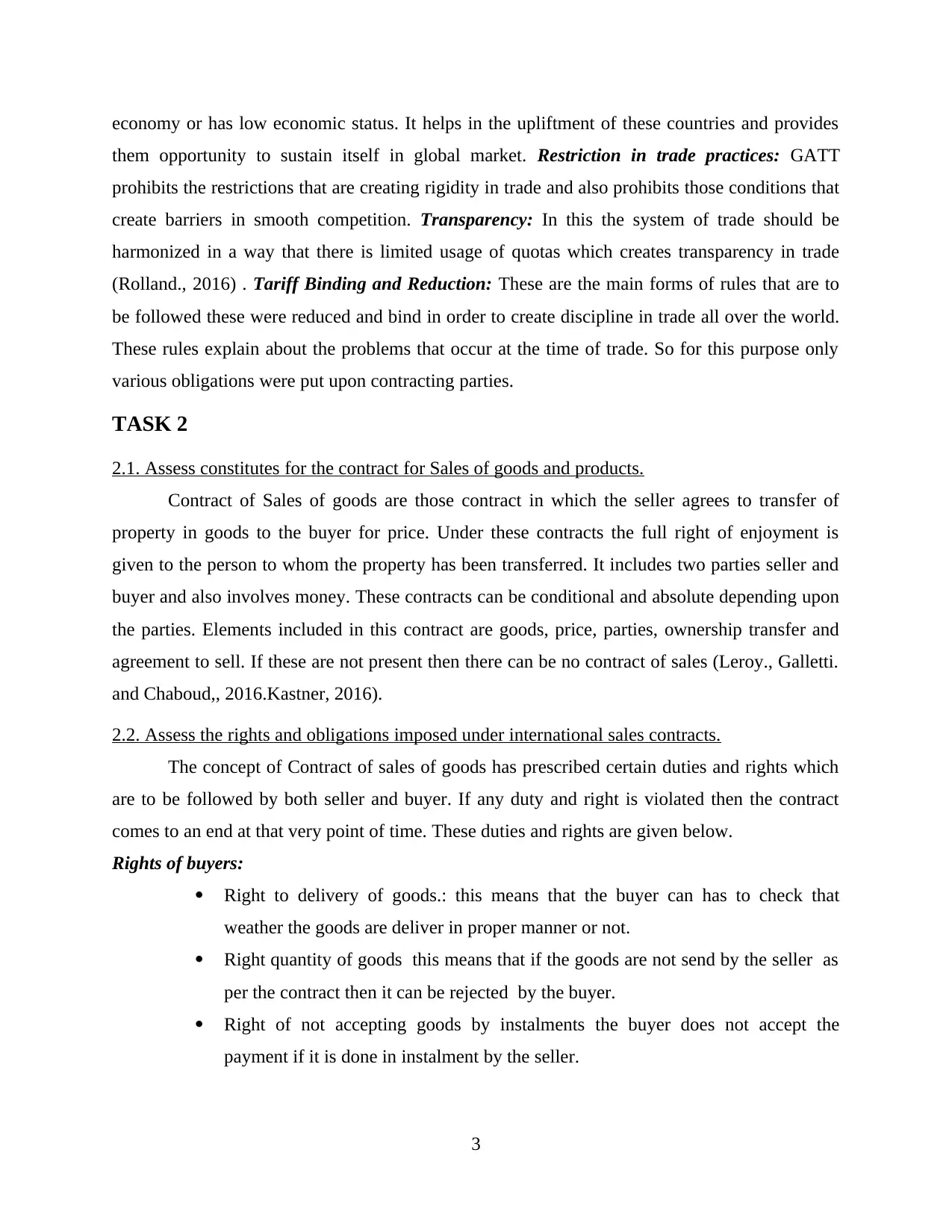
economy or has low economic status. It helps in the upliftment of these countries and provides
them opportunity to sustain itself in global market. Restriction in trade practices: GATT
prohibits the restrictions that are creating rigidity in trade and also prohibits those conditions that
create barriers in smooth competition. Transparency: In this the system of trade should be
harmonized in a way that there is limited usage of quotas which creates transparency in trade
(Rolland., 2016) . Tariff Binding and Reduction: These are the main forms of rules that are to
be followed these were reduced and bind in order to create discipline in trade all over the world.
These rules explain about the problems that occur at the time of trade. So for this purpose only
various obligations were put upon contracting parties.
TASK 2
2.1. Assess constitutes for the contract for Sales of goods and products.
Contract of Sales of goods are those contract in which the seller agrees to transfer of
property in goods to the buyer for price. Under these contracts the full right of enjoyment is
given to the person to whom the property has been transferred. It includes two parties seller and
buyer and also involves money. These contracts can be conditional and absolute depending upon
the parties. Elements included in this contract are goods, price, parties, ownership transfer and
agreement to sell. If these are not present then there can be no contract of sales (Leroy., Galletti.
and Chaboud,, 2016.Kastner, 2016).
2.2. Assess the rights and obligations imposed under international sales contracts.
The concept of Contract of sales of goods has prescribed certain duties and rights which
are to be followed by both seller and buyer. If any duty and right is violated then the contract
comes to an end at that very point of time. These duties and rights are given below.
Rights of buyers:
Right to delivery of goods.: this means that the buyer can has to check that
weather the goods are deliver in proper manner or not.
Right quantity of goods this means that if the goods are not send by the seller as
per the contract then it can be rejected by the buyer.
Right of not accepting goods by instalments the buyer does not accept the
payment if it is done in instalment by the seller.
3
them opportunity to sustain itself in global market. Restriction in trade practices: GATT
prohibits the restrictions that are creating rigidity in trade and also prohibits those conditions that
create barriers in smooth competition. Transparency: In this the system of trade should be
harmonized in a way that there is limited usage of quotas which creates transparency in trade
(Rolland., 2016) . Tariff Binding and Reduction: These are the main forms of rules that are to
be followed these were reduced and bind in order to create discipline in trade all over the world.
These rules explain about the problems that occur at the time of trade. So for this purpose only
various obligations were put upon contracting parties.
TASK 2
2.1. Assess constitutes for the contract for Sales of goods and products.
Contract of Sales of goods are those contract in which the seller agrees to transfer of
property in goods to the buyer for price. Under these contracts the full right of enjoyment is
given to the person to whom the property has been transferred. It includes two parties seller and
buyer and also involves money. These contracts can be conditional and absolute depending upon
the parties. Elements included in this contract are goods, price, parties, ownership transfer and
agreement to sell. If these are not present then there can be no contract of sales (Leroy., Galletti.
and Chaboud,, 2016.Kastner, 2016).
2.2. Assess the rights and obligations imposed under international sales contracts.
The concept of Contract of sales of goods has prescribed certain duties and rights which
are to be followed by both seller and buyer. If any duty and right is violated then the contract
comes to an end at that very point of time. These duties and rights are given below.
Rights of buyers:
Right to delivery of goods.: this means that the buyer can has to check that
weather the goods are deliver in proper manner or not.
Right quantity of goods this means that if the goods are not send by the seller as
per the contract then it can be rejected by the buyer.
Right of not accepting goods by instalments the buyer does not accept the
payment if it is done in instalment by the seller.
3
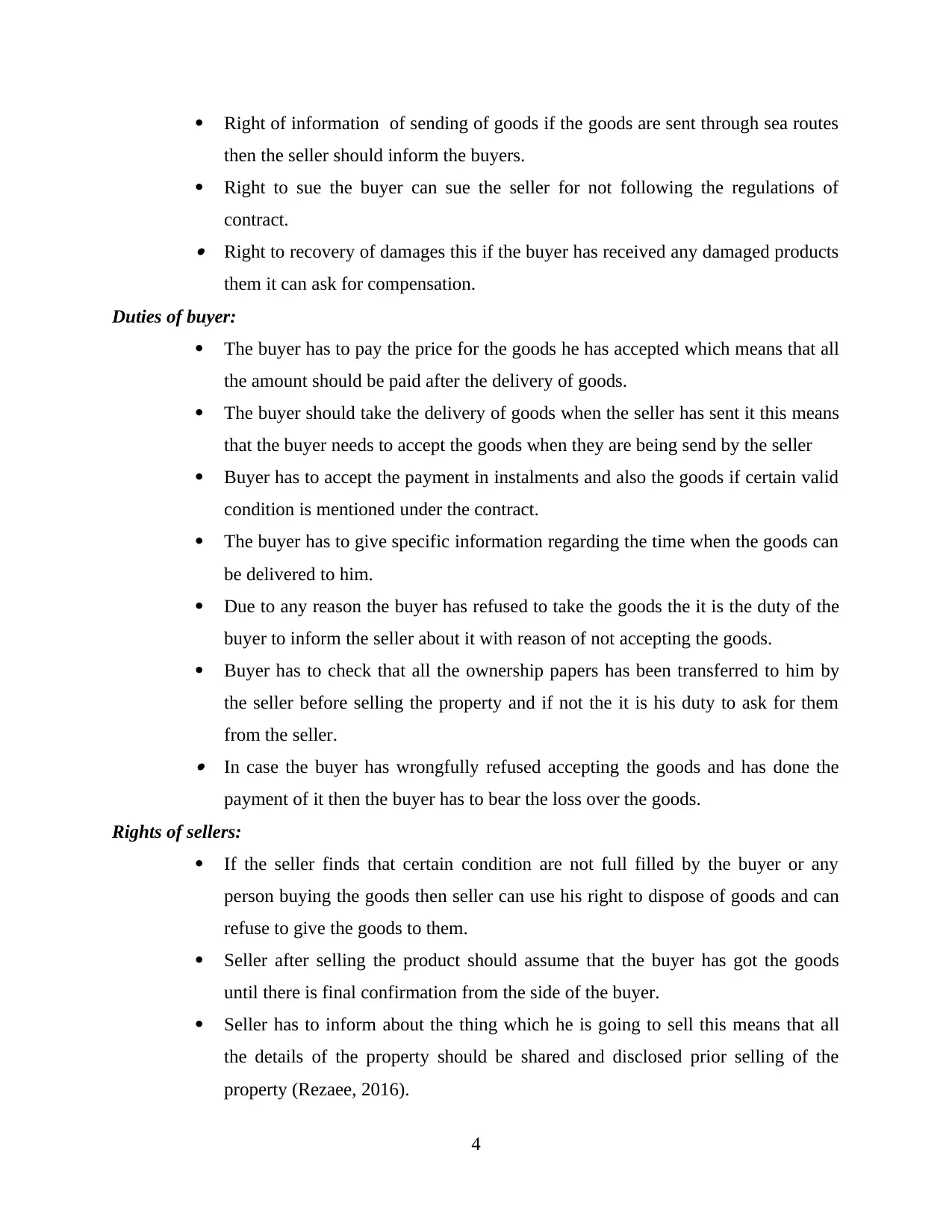
Right of information of sending of goods if the goods are sent through sea routes
then the seller should inform the buyers.
Right to sue the buyer can sue the seller for not following the regulations of
contract.
Right to recovery of damages this if the buyer has received any damaged products
them it can ask for compensation.
Duties of buyer:
The buyer has to pay the price for the goods he has accepted which means that all
the amount should be paid after the delivery of goods.
The buyer should take the delivery of goods when the seller has sent it this means
that the buyer needs to accept the goods when they are being send by the seller
Buyer has to accept the payment in instalments and also the goods if certain valid
condition is mentioned under the contract.
The buyer has to give specific information regarding the time when the goods can
be delivered to him.
Due to any reason the buyer has refused to take the goods the it is the duty of the
buyer to inform the seller about it with reason of not accepting the goods.
Buyer has to check that all the ownership papers has been transferred to him by
the seller before selling the property and if not the it is his duty to ask for them
from the seller.
In case the buyer has wrongfully refused accepting the goods and has done the
payment of it then the buyer has to bear the loss over the goods.
Rights of sellers:
If the seller finds that certain condition are not full filled by the buyer or any
person buying the goods then seller can use his right to dispose of goods and can
refuse to give the goods to them.
Seller after selling the product should assume that the buyer has got the goods
until there is final confirmation from the side of the buyer.
Seller has to inform about the thing which he is going to sell this means that all
the details of the property should be shared and disclosed prior selling of the
property (Rezaee, 2016).
4
then the seller should inform the buyers.
Right to sue the buyer can sue the seller for not following the regulations of
contract.
Right to recovery of damages this if the buyer has received any damaged products
them it can ask for compensation.
Duties of buyer:
The buyer has to pay the price for the goods he has accepted which means that all
the amount should be paid after the delivery of goods.
The buyer should take the delivery of goods when the seller has sent it this means
that the buyer needs to accept the goods when they are being send by the seller
Buyer has to accept the payment in instalments and also the goods if certain valid
condition is mentioned under the contract.
The buyer has to give specific information regarding the time when the goods can
be delivered to him.
Due to any reason the buyer has refused to take the goods the it is the duty of the
buyer to inform the seller about it with reason of not accepting the goods.
Buyer has to check that all the ownership papers has been transferred to him by
the seller before selling the property and if not the it is his duty to ask for them
from the seller.
In case the buyer has wrongfully refused accepting the goods and has done the
payment of it then the buyer has to bear the loss over the goods.
Rights of sellers:
If the seller finds that certain condition are not full filled by the buyer or any
person buying the goods then seller can use his right to dispose of goods and can
refuse to give the goods to them.
Seller after selling the product should assume that the buyer has got the goods
until there is final confirmation from the side of the buyer.
Seller has to inform about the thing which he is going to sell this means that all
the details of the property should be shared and disclosed prior selling of the
property (Rezaee, 2016).
4
⊘ This is a preview!⊘
Do you want full access?
Subscribe today to unlock all pages.

Trusted by 1+ million students worldwide
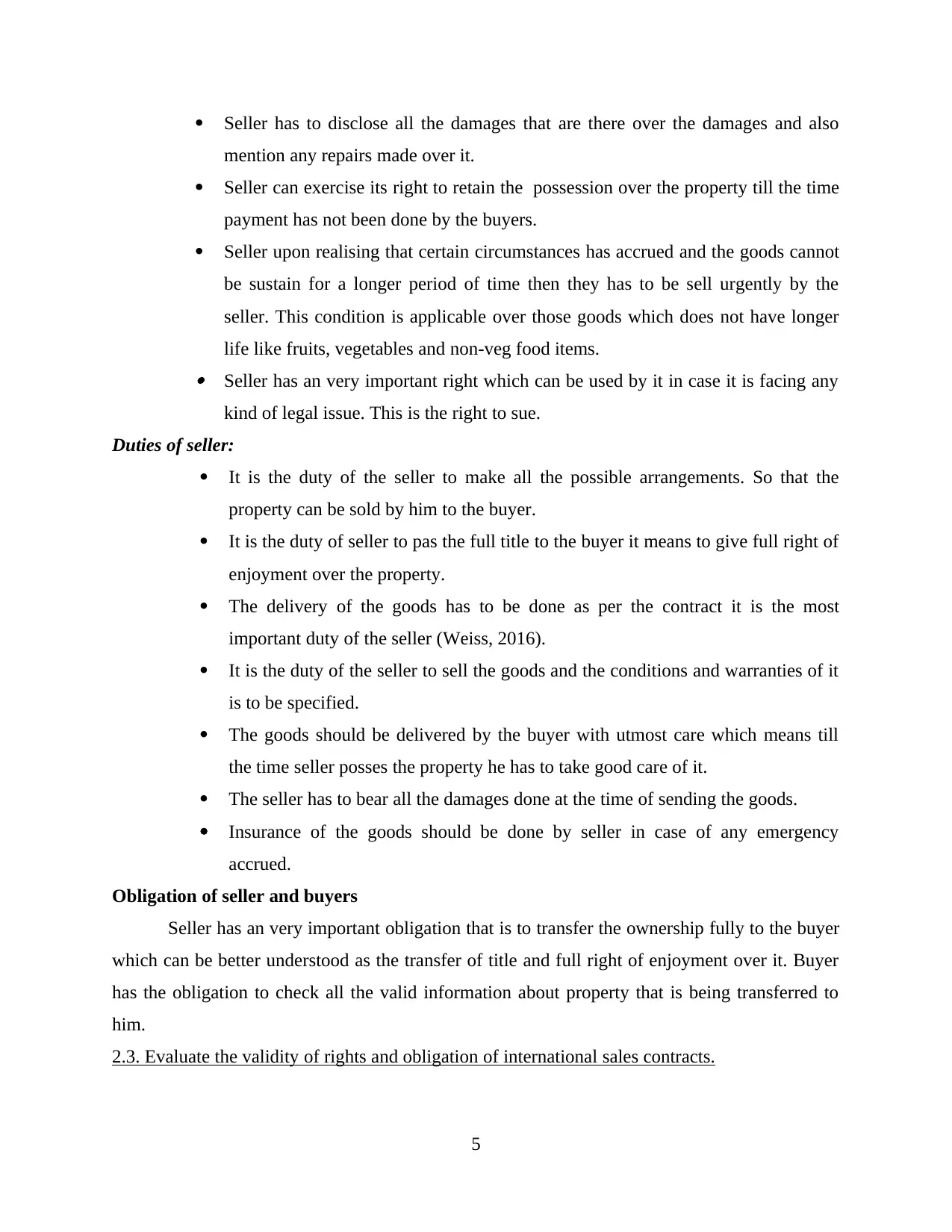
Seller has to disclose all the damages that are there over the damages and also
mention any repairs made over it.
Seller can exercise its right to retain the possession over the property till the time
payment has not been done by the buyers.
Seller upon realising that certain circumstances has accrued and the goods cannot
be sustain for a longer period of time then they has to be sell urgently by the
seller. This condition is applicable over those goods which does not have longer
life like fruits, vegetables and non-veg food items.
Seller has an very important right which can be used by it in case it is facing any
kind of legal issue. This is the right to sue.
Duties of seller:
It is the duty of the seller to make all the possible arrangements. So that the
property can be sold by him to the buyer.
It is the duty of seller to pas the full title to the buyer it means to give full right of
enjoyment over the property.
The delivery of the goods has to be done as per the contract it is the most
important duty of the seller (Weiss, 2016).
It is the duty of the seller to sell the goods and the conditions and warranties of it
is to be specified.
The goods should be delivered by the buyer with utmost care which means till
the time seller posses the property he has to take good care of it.
The seller has to bear all the damages done at the time of sending the goods.
Insurance of the goods should be done by seller in case of any emergency
accrued.
Obligation of seller and buyers
Seller has an very important obligation that is to transfer the ownership fully to the buyer
which can be better understood as the transfer of title and full right of enjoyment over it. Buyer
has the obligation to check all the valid information about property that is being transferred to
him.
2.3. Evaluate the validity of rights and obligation of international sales contracts.
5
mention any repairs made over it.
Seller can exercise its right to retain the possession over the property till the time
payment has not been done by the buyers.
Seller upon realising that certain circumstances has accrued and the goods cannot
be sustain for a longer period of time then they has to be sell urgently by the
seller. This condition is applicable over those goods which does not have longer
life like fruits, vegetables and non-veg food items.
Seller has an very important right which can be used by it in case it is facing any
kind of legal issue. This is the right to sue.
Duties of seller:
It is the duty of the seller to make all the possible arrangements. So that the
property can be sold by him to the buyer.
It is the duty of seller to pas the full title to the buyer it means to give full right of
enjoyment over the property.
The delivery of the goods has to be done as per the contract it is the most
important duty of the seller (Weiss, 2016).
It is the duty of the seller to sell the goods and the conditions and warranties of it
is to be specified.
The goods should be delivered by the buyer with utmost care which means till
the time seller posses the property he has to take good care of it.
The seller has to bear all the damages done at the time of sending the goods.
Insurance of the goods should be done by seller in case of any emergency
accrued.
Obligation of seller and buyers
Seller has an very important obligation that is to transfer the ownership fully to the buyer
which can be better understood as the transfer of title and full right of enjoyment over it. Buyer
has the obligation to check all the valid information about property that is being transferred to
him.
2.3. Evaluate the validity of rights and obligation of international sales contracts.
5
Paraphrase This Document
Need a fresh take? Get an instant paraphrase of this document with our AI Paraphraser
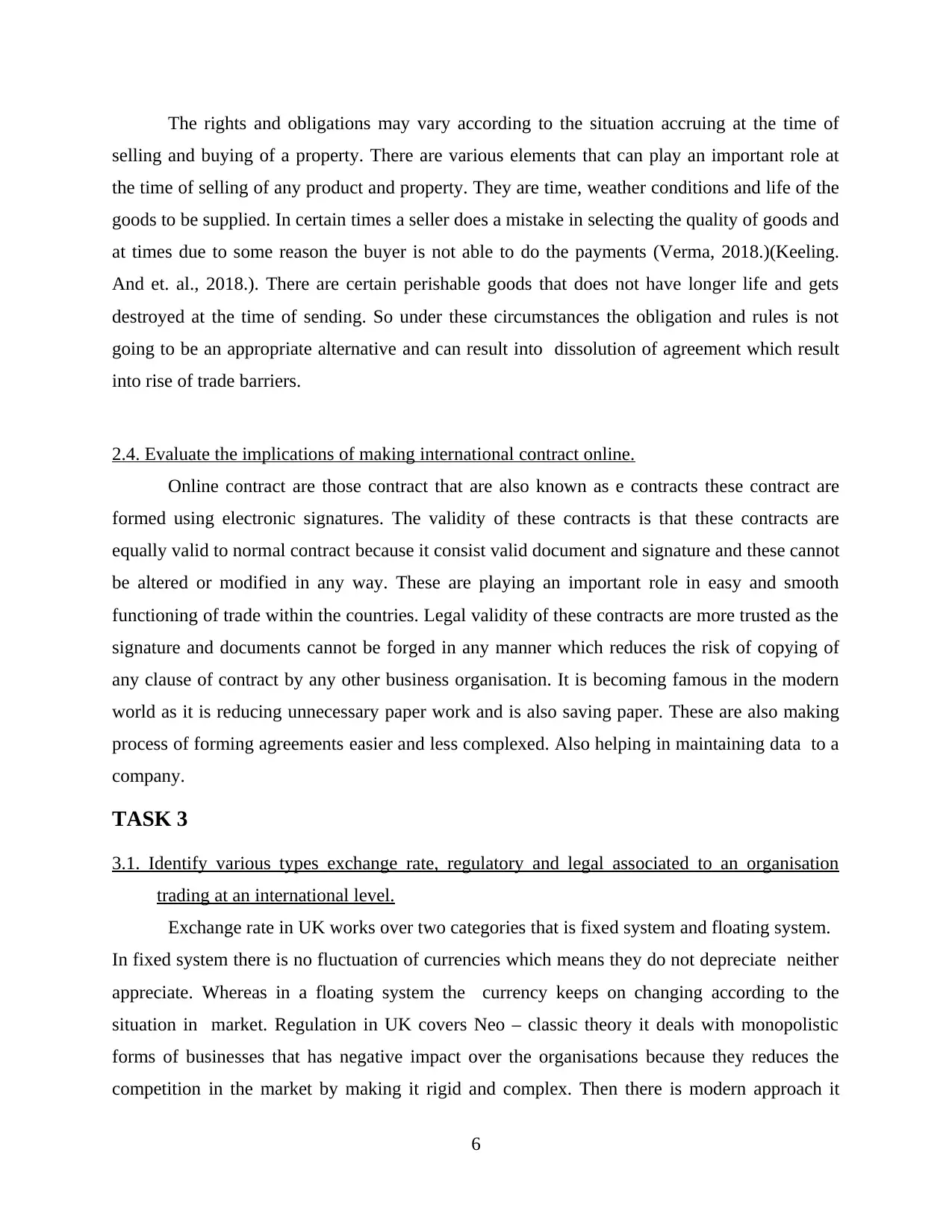
The rights and obligations may vary according to the situation accruing at the time of
selling and buying of a property. There are various elements that can play an important role at
the time of selling of any product and property. They are time, weather conditions and life of the
goods to be supplied. In certain times a seller does a mistake in selecting the quality of goods and
at times due to some reason the buyer is not able to do the payments (Verma, 2018.)(Keeling.
And et. al., 2018.). There are certain perishable goods that does not have longer life and gets
destroyed at the time of sending. So under these circumstances the obligation and rules is not
going to be an appropriate alternative and can result into dissolution of agreement which result
into rise of trade barriers.
2.4. Evaluate the implications of making international contract online.
Online contract are those contract that are also known as e contracts these contract are
formed using electronic signatures. The validity of these contracts is that these contracts are
equally valid to normal contract because it consist valid document and signature and these cannot
be altered or modified in any way. These are playing an important role in easy and smooth
functioning of trade within the countries. Legal validity of these contracts are more trusted as the
signature and documents cannot be forged in any manner which reduces the risk of copying of
any clause of contract by any other business organisation. It is becoming famous in the modern
world as it is reducing unnecessary paper work and is also saving paper. These are also making
process of forming agreements easier and less complexed. Also helping in maintaining data to a
company.
TASK 3
3.1. Identify various types exchange rate, regulatory and legal associated to an organisation
trading at an international level.
Exchange rate in UK works over two categories that is fixed system and floating system.
In fixed system there is no fluctuation of currencies which means they do not depreciate neither
appreciate. Whereas in a floating system the currency keeps on changing according to the
situation in market. Regulation in UK covers Neo – classic theory it deals with monopolistic
forms of businesses that has negative impact over the organisations because they reduces the
competition in the market by making it rigid and complex. Then there is modern approach it
6
selling and buying of a property. There are various elements that can play an important role at
the time of selling of any product and property. They are time, weather conditions and life of the
goods to be supplied. In certain times a seller does a mistake in selecting the quality of goods and
at times due to some reason the buyer is not able to do the payments (Verma, 2018.)(Keeling.
And et. al., 2018.). There are certain perishable goods that does not have longer life and gets
destroyed at the time of sending. So under these circumstances the obligation and rules is not
going to be an appropriate alternative and can result into dissolution of agreement which result
into rise of trade barriers.
2.4. Evaluate the implications of making international contract online.
Online contract are those contract that are also known as e contracts these contract are
formed using electronic signatures. The validity of these contracts is that these contracts are
equally valid to normal contract because it consist valid document and signature and these cannot
be altered or modified in any way. These are playing an important role in easy and smooth
functioning of trade within the countries. Legal validity of these contracts are more trusted as the
signature and documents cannot be forged in any manner which reduces the risk of copying of
any clause of contract by any other business organisation. It is becoming famous in the modern
world as it is reducing unnecessary paper work and is also saving paper. These are also making
process of forming agreements easier and less complexed. Also helping in maintaining data to a
company.
TASK 3
3.1. Identify various types exchange rate, regulatory and legal associated to an organisation
trading at an international level.
Exchange rate in UK works over two categories that is fixed system and floating system.
In fixed system there is no fluctuation of currencies which means they do not depreciate neither
appreciate. Whereas in a floating system the currency keeps on changing according to the
situation in market. Regulation in UK covers Neo – classic theory it deals with monopolistic
forms of businesses that has negative impact over the organisations because they reduces the
competition in the market by making it rigid and complex. Then there is modern approach it
6
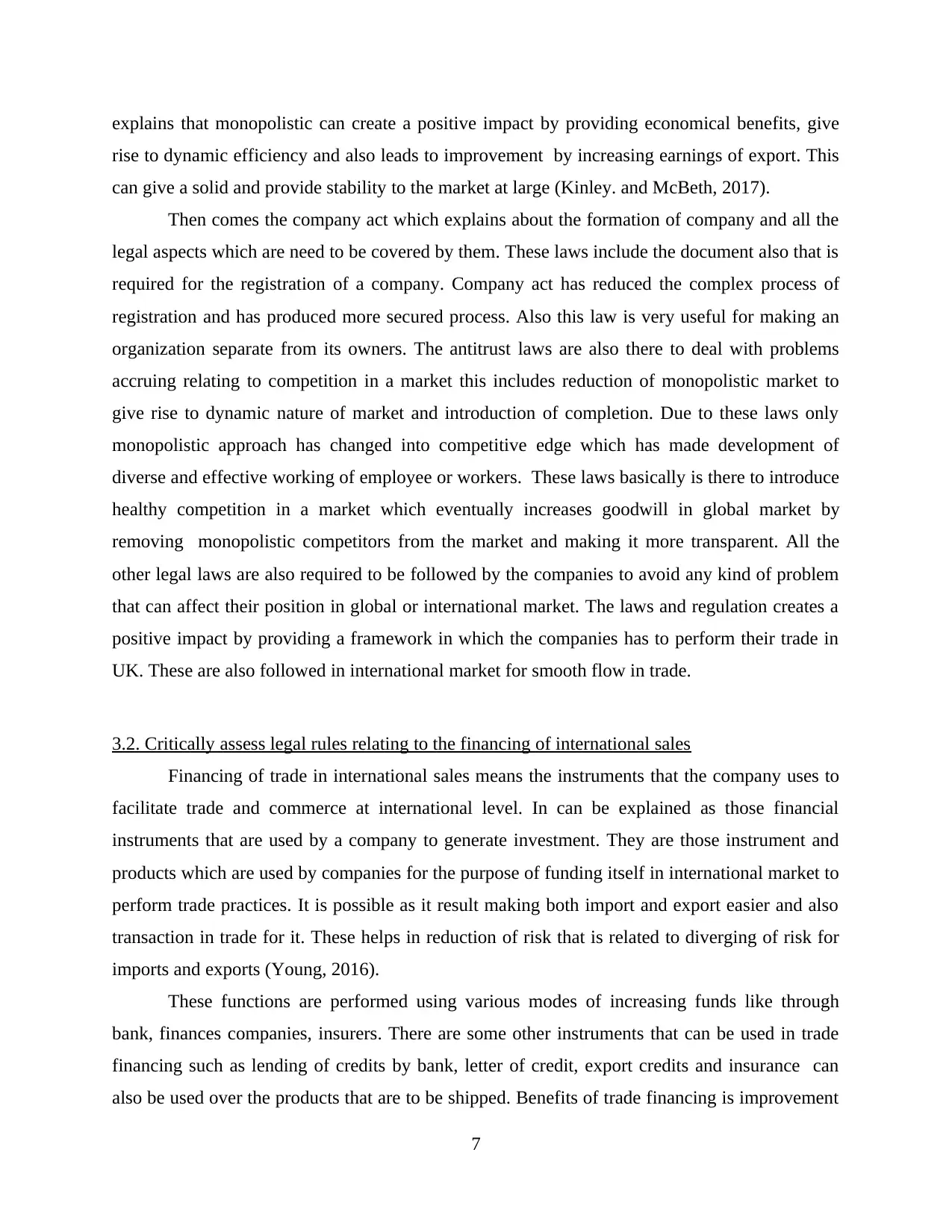
explains that monopolistic can create a positive impact by providing economical benefits, give
rise to dynamic efficiency and also leads to improvement by increasing earnings of export. This
can give a solid and provide stability to the market at large (Kinley. and McBeth, 2017).
Then comes the company act which explains about the formation of company and all the
legal aspects which are need to be covered by them. These laws include the document also that is
required for the registration of a company. Company act has reduced the complex process of
registration and has produced more secured process. Also this law is very useful for making an
organization separate from its owners. The antitrust laws are also there to deal with problems
accruing relating to competition in a market this includes reduction of monopolistic market to
give rise to dynamic nature of market and introduction of completion. Due to these laws only
monopolistic approach has changed into competitive edge which has made development of
diverse and effective working of employee or workers. These laws basically is there to introduce
healthy competition in a market which eventually increases goodwill in global market by
removing monopolistic competitors from the market and making it more transparent. All the
other legal laws are also required to be followed by the companies to avoid any kind of problem
that can affect their position in global or international market. The laws and regulation creates a
positive impact by providing a framework in which the companies has to perform their trade in
UK. These are also followed in international market for smooth flow in trade.
3.2. Critically assess legal rules relating to the financing of international sales
Financing of trade in international sales means the instruments that the company uses to
facilitate trade and commerce at international level. In can be explained as those financial
instruments that are used by a company to generate investment. They are those instrument and
products which are used by companies for the purpose of funding itself in international market to
perform trade practices. It is possible as it result making both import and export easier and also
transaction in trade for it. These helps in reduction of risk that is related to diverging of risk for
imports and exports (Young, 2016).
These functions are performed using various modes of increasing funds like through
bank, finances companies, insurers. There are some other instruments that can be used in trade
financing such as lending of credits by bank, letter of credit, export credits and insurance can
also be used over the products that are to be shipped. Benefits of trade financing is improvement
7
rise to dynamic efficiency and also leads to improvement by increasing earnings of export. This
can give a solid and provide stability to the market at large (Kinley. and McBeth, 2017).
Then comes the company act which explains about the formation of company and all the
legal aspects which are need to be covered by them. These laws include the document also that is
required for the registration of a company. Company act has reduced the complex process of
registration and has produced more secured process. Also this law is very useful for making an
organization separate from its owners. The antitrust laws are also there to deal with problems
accruing relating to competition in a market this includes reduction of monopolistic market to
give rise to dynamic nature of market and introduction of completion. Due to these laws only
monopolistic approach has changed into competitive edge which has made development of
diverse and effective working of employee or workers. These laws basically is there to introduce
healthy competition in a market which eventually increases goodwill in global market by
removing monopolistic competitors from the market and making it more transparent. All the
other legal laws are also required to be followed by the companies to avoid any kind of problem
that can affect their position in global or international market. The laws and regulation creates a
positive impact by providing a framework in which the companies has to perform their trade in
UK. These are also followed in international market for smooth flow in trade.
3.2. Critically assess legal rules relating to the financing of international sales
Financing of trade in international sales means the instruments that the company uses to
facilitate trade and commerce at international level. In can be explained as those financial
instruments that are used by a company to generate investment. They are those instrument and
products which are used by companies for the purpose of funding itself in international market to
perform trade practices. It is possible as it result making both import and export easier and also
transaction in trade for it. These helps in reduction of risk that is related to diverging of risk for
imports and exports (Young, 2016).
These functions are performed using various modes of increasing funds like through
bank, finances companies, insurers. There are some other instruments that can be used in trade
financing such as lending of credits by bank, letter of credit, export credits and insurance can
also be used over the products that are to be shipped. Benefits of trade financing is improvement
7
⊘ This is a preview!⊘
Do you want full access?
Subscribe today to unlock all pages.

Trusted by 1+ million students worldwide
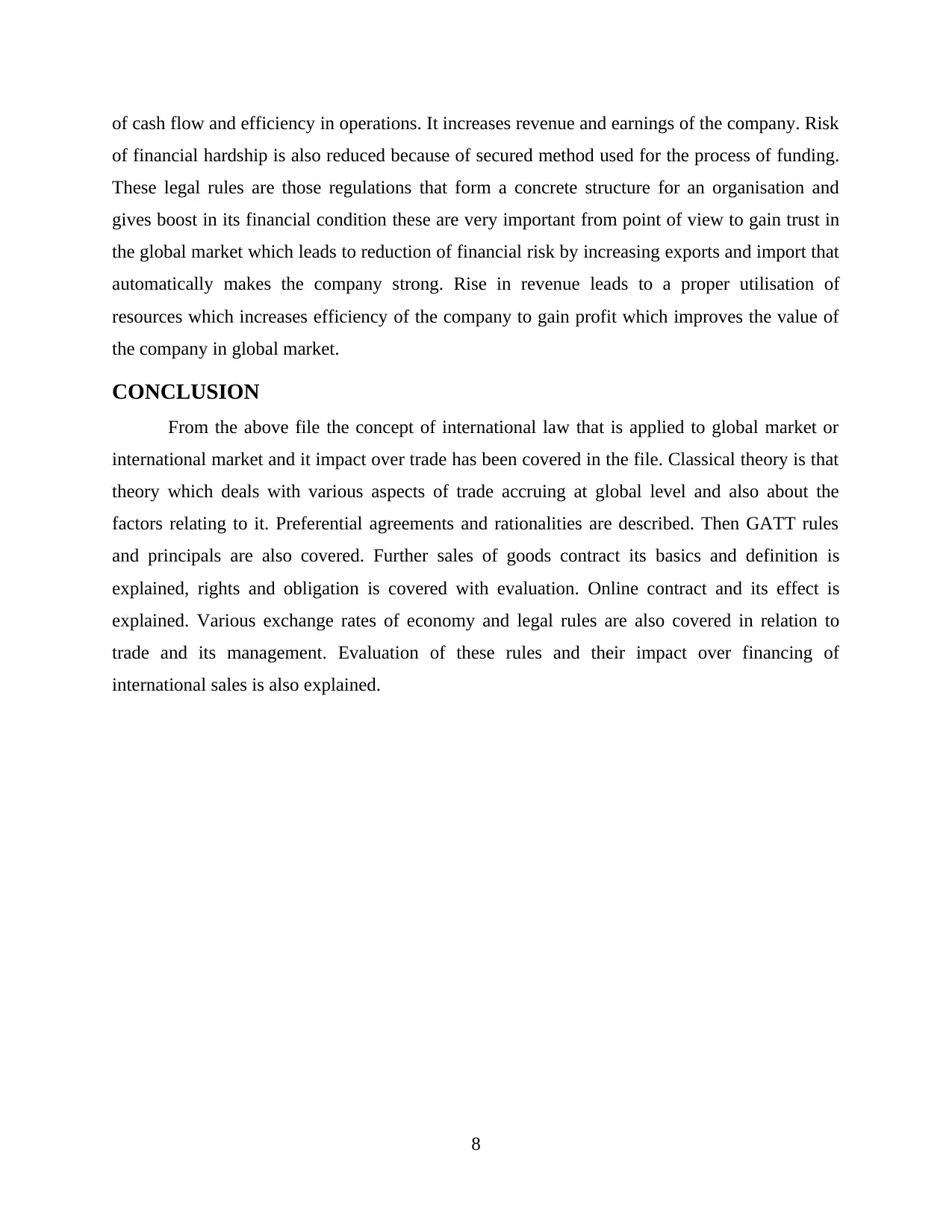
of cash flow and efficiency in operations. It increases revenue and earnings of the company. Risk
of financial hardship is also reduced because of secured method used for the process of funding.
These legal rules are those regulations that form a concrete structure for an organisation and
gives boost in its financial condition these are very important from point of view to gain trust in
the global market which leads to reduction of financial risk by increasing exports and import that
automatically makes the company strong. Rise in revenue leads to a proper utilisation of
resources which increases efficiency of the company to gain profit which improves the value of
the company in global market.
CONCLUSION
From the above file the concept of international law that is applied to global market or
international market and it impact over trade has been covered in the file. Classical theory is that
theory which deals with various aspects of trade accruing at global level and also about the
factors relating to it. Preferential agreements and rationalities are described. Then GATT rules
and principals are also covered. Further sales of goods contract its basics and definition is
explained, rights and obligation is covered with evaluation. Online contract and its effect is
explained. Various exchange rates of economy and legal rules are also covered in relation to
trade and its management. Evaluation of these rules and their impact over financing of
international sales is also explained.
8
of financial hardship is also reduced because of secured method used for the process of funding.
These legal rules are those regulations that form a concrete structure for an organisation and
gives boost in its financial condition these are very important from point of view to gain trust in
the global market which leads to reduction of financial risk by increasing exports and import that
automatically makes the company strong. Rise in revenue leads to a proper utilisation of
resources which increases efficiency of the company to gain profit which improves the value of
the company in global market.
CONCLUSION
From the above file the concept of international law that is applied to global market or
international market and it impact over trade has been covered in the file. Classical theory is that
theory which deals with various aspects of trade accruing at global level and also about the
factors relating to it. Preferential agreements and rationalities are described. Then GATT rules
and principals are also covered. Further sales of goods contract its basics and definition is
explained, rights and obligation is covered with evaluation. Online contract and its effect is
explained. Various exchange rates of economy and legal rules are also covered in relation to
trade and its management. Evaluation of these rules and their impact over financing of
international sales is also explained.
8
Paraphrase This Document
Need a fresh take? Get an instant paraphrase of this document with our AI Paraphraser
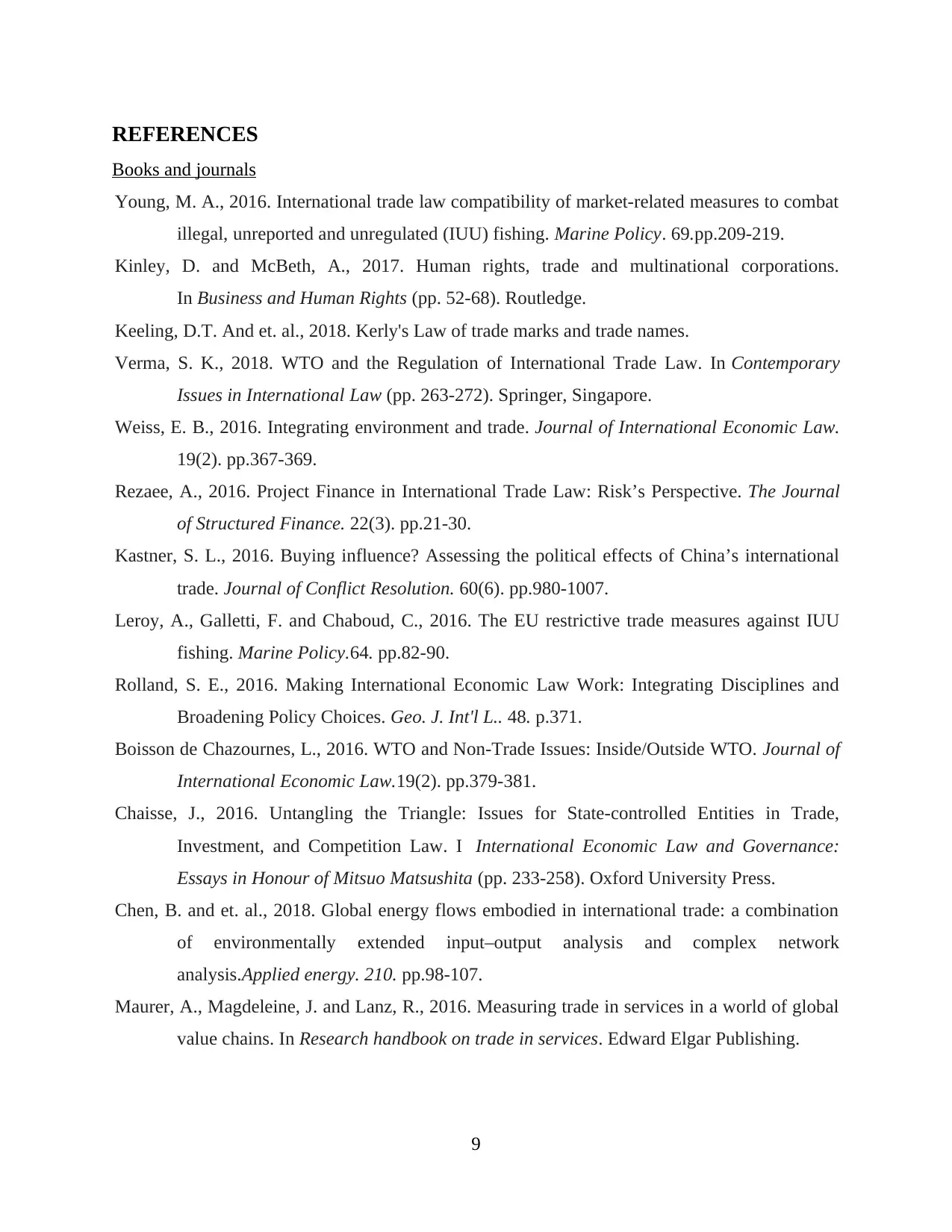
REFERENCES
Books and journals
Young, M. A., 2016. International trade law compatibility of market-related measures to combat
illegal, unreported and unregulated (IUU) fishing. Marine Policy. 69.pp.209-219.
Kinley, D. and McBeth, A., 2017. Human rights, trade and multinational corporations.
In Business and Human Rights (pp. 52-68). Routledge.
Keeling, D.T. And et. al., 2018. Kerly's Law of trade marks and trade names.
Verma, S. K., 2018. WTO and the Regulation of International Trade Law. In Contemporary
Issues in International Law (pp. 263-272). Springer, Singapore.
Weiss, E. B., 2016. Integrating environment and trade. Journal of International Economic Law.
19(2). pp.367-369.
Rezaee, A., 2016. Project Finance in International Trade Law: Risk’s Perspective. The Journal
of Structured Finance. 22(3). pp.21-30.
Kastner, S. L., 2016. Buying influence? Assessing the political effects of China’s international
trade. Journal of Conflict Resolution. 60(6). pp.980-1007.
Leroy, A., Galletti, F. and Chaboud, C., 2016. The EU restrictive trade measures against IUU
fishing. Marine Policy.64. pp.82-90.
Rolland, S. E., 2016. Making International Economic Law Work: Integrating Disciplines and
Broadening Policy Choices. Geo. J. Int'l L.. 48. p.371.
Boisson de Chazournes, L., 2016. WTO and Non-Trade Issues: Inside/Outside WTO. Journal of
International Economic Law.19(2). pp.379-381.
Chaisse, J., 2016. Untangling the Triangle: Issues for State-controlled Entities in Trade,
Investment, and Competition Law. I International Economic Law and Governance:
Essays in Honour of Mitsuo Matsushita (pp. 233-258). Oxford University Press.
Chen, B. and et. al., 2018. Global energy flows embodied in international trade: a combination
of environmentally extended input–output analysis and complex network
analysis.Applied energy. 210. pp.98-107.
Maurer, A., Magdeleine, J. and Lanz, R., 2016. Measuring trade in services in a world of global
value chains. In Research handbook on trade in services. Edward Elgar Publishing.
9
Books and journals
Young, M. A., 2016. International trade law compatibility of market-related measures to combat
illegal, unreported and unregulated (IUU) fishing. Marine Policy. 69.pp.209-219.
Kinley, D. and McBeth, A., 2017. Human rights, trade and multinational corporations.
In Business and Human Rights (pp. 52-68). Routledge.
Keeling, D.T. And et. al., 2018. Kerly's Law of trade marks and trade names.
Verma, S. K., 2018. WTO and the Regulation of International Trade Law. In Contemporary
Issues in International Law (pp. 263-272). Springer, Singapore.
Weiss, E. B., 2016. Integrating environment and trade. Journal of International Economic Law.
19(2). pp.367-369.
Rezaee, A., 2016. Project Finance in International Trade Law: Risk’s Perspective. The Journal
of Structured Finance. 22(3). pp.21-30.
Kastner, S. L., 2016. Buying influence? Assessing the political effects of China’s international
trade. Journal of Conflict Resolution. 60(6). pp.980-1007.
Leroy, A., Galletti, F. and Chaboud, C., 2016. The EU restrictive trade measures against IUU
fishing. Marine Policy.64. pp.82-90.
Rolland, S. E., 2016. Making International Economic Law Work: Integrating Disciplines and
Broadening Policy Choices. Geo. J. Int'l L.. 48. p.371.
Boisson de Chazournes, L., 2016. WTO and Non-Trade Issues: Inside/Outside WTO. Journal of
International Economic Law.19(2). pp.379-381.
Chaisse, J., 2016. Untangling the Triangle: Issues for State-controlled Entities in Trade,
Investment, and Competition Law. I International Economic Law and Governance:
Essays in Honour of Mitsuo Matsushita (pp. 233-258). Oxford University Press.
Chen, B. and et. al., 2018. Global energy flows embodied in international trade: a combination
of environmentally extended input–output analysis and complex network
analysis.Applied energy. 210. pp.98-107.
Maurer, A., Magdeleine, J. and Lanz, R., 2016. Measuring trade in services in a world of global
value chains. In Research handbook on trade in services. Edward Elgar Publishing.
9
1 out of 11
Related Documents
Your All-in-One AI-Powered Toolkit for Academic Success.
+13062052269
info@desklib.com
Available 24*7 on WhatsApp / Email
![[object Object]](/_next/static/media/star-bottom.7253800d.svg)
Unlock your academic potential
Copyright © 2020–2025 A2Z Services. All Rights Reserved. Developed and managed by ZUCOL.





